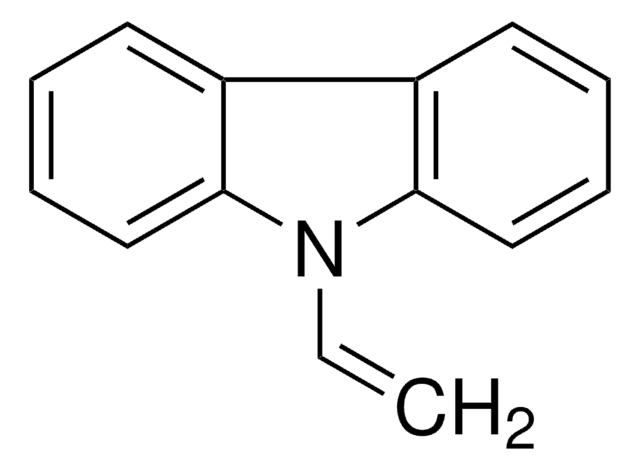368350
Poly(9-vinylcarbazole)
average Mn 25,000-50,000
Synonyme(s) :
PVK
About This Item
Produits recommandés
Poids mol.
average Mn 25,000-50,000
Niveau de qualité
Pf
>300 °C
Densité
1.2 g/mL at 25 °C (lit.)
Énergie orbitale
HOMO 5.8 eV
LUMO 2.2 eV
Performance des dispositifs OLED
ITO/PEDOT:PSS/PVK/PFO:Ir(btpy)3 (5 wt%)/Ca
ITO/PEDOT:PSS/PVK:FIr6 (10 wt%)/TPBI/CsF:Al
ITO/PEDOT:PSS/PVK:Ir(mppy)2 (6 wt%)/Bphen/LiF:Al
Mw/Mn
~2
InChI
1S/C14H11N/c1-2-15-13-9-5-3-7-11(13)12-8-4-6-10-14(12)15/h2-10H,1H2
Clé InChI
KKFHAJHLJHVUDM-UHFFFAOYSA-N
Vous recherchez des produits similaires ? Visite Guide de comparaison des produits
Description générale
Application
Code de la classe de stockage
11 - Combustible Solids
Classe de danger pour l'eau (WGK)
WGK 2
Point d'éclair (°F)
Not applicable
Point d'éclair (°C)
Not applicable
Faites votre choix parmi les versions les plus récentes :
Déjà en possession de ce produit ?
Retrouvez la documentation relative aux produits que vous avez récemment achetés dans la Bibliothèque de documents.
Les clients ont également consulté
Notre équipe de scientifiques dispose d'une expérience dans tous les secteurs de la recherche, notamment en sciences de la vie, science des matériaux, synthèse chimique, chromatographie, analyse et dans de nombreux autres domaines..
Contacter notre Service technique



![Poly[2-methoxy-5-(2-ethylhexyloxy)-1,4-phenylenevinylene] average Mn 40,000-70,000](/deepweb/assets/sigmaaldrich/product/structures/344/488/b8f8179d-3970-4deb-a754-adda88cdb36f/640/b8f8179d-3970-4deb-a754-adda88cdb36f.png)






